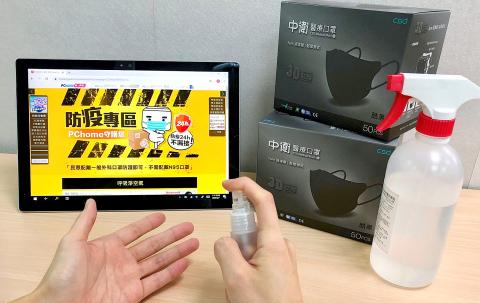The nation’s leading e-commerce operators Momo.com Inc (富邦媒體) and PChome Online Inc (網路家庭) posted record-high sales last month, on the back of the Lunar New Year holiday and growing concern over the spreading 2019 novel coronavirus (2019-nCoV).
Momo saw its revenue grow 15.09 percent year-on-year to NT$4.93 billion (US$163.78 million), while PChome posted a 5.52 percent increase to NT$3.62 billion.
Momo said the holiday boosted sales of food products, gift sets and cosmetics, while PChome said it benefited from robust sales of consumer electronics, including smartphones, with Apple and Samsung being the preferred brands, and home appliances, such as robotic vacuum cleaners and air fryers.

Photo: CNA
As Taiwan last month confirmed its first case of the 2019-nCoV, Momo and PChome said they saw surging sales of N95 respirators, surgical masks and other types of masks, with orders during the holiday growing 7 to 10 times compared with the monthly average.
The two companies added that sales of wet wipes, hand sanitizers and bleach among other disinfecting agents surged during the period.
E-commerce start-up Kuobrothers Corp (創業家兄弟), which reported revenue of NT$383.53 million for last month, said that mask sales increased by more than fourfold, while sales of automatic soap dispensers and air purifiers also rose.
PChome subsidiary Ruten.com (露天拍賣) said that it saw an increase in keyword searches for non-woven fabric and sewing machines as consumers look to make their own masks.
That came after the Central Epidemic Command Center on Jan. 31 centralized the distribution of medical masks and banned their exports.
Sales of board games and video game consoles rose as more people stayed indoors to avoid the virus, tallies compiled by Momo and PChome showed.
Momo reported robust sales of Nintendo Co’s Switch game consoles and games, and Sony Corp’s PlayStation 4 consoles, in addition to healthy sales of automatic mahjong tables.
PChome also reported increased sales of home exercise equipment, such as treadmills and gym weights.
The company said it is looking to further boost revenue this month by promoting Valentine’s Day sales and back-to-school items.
Momo is pushing Valentine’s Day promotions in cooperation with various brands and offering cashback incentives.

SEMICONDUCTOR SERVICES: A company executive said that Taiwanese firms must think about how to participate in global supply chains and lift their competitiveness Taiwan Semiconductor Manufacturing Co (TSMC, 台積電) yesterday said it expects to launch its first multifunctional service center in Pingtung County in the middle of 2027, in a bid to foster a resilient high-tech facility construction ecosystem. TSMC broached the idea of creating a center two or three years ago when it started building new manufacturing capacity in the US and Japan, the company said. The center, dubbed an “ecosystem park,” would assist local manufacturing facility construction partners to upgrade their capabilities and secure more deals from other global chipmakers such as Intel Corp, Micron Technology Inc and Infineon Technologies AG, TSMC said. It

NO BREAKTHROUGH? More substantial ‘deliverables,’ such as tariff reductions, would likely be saved for a meeting between Trump and Xi later this year, a trade expert said China launched two probes targeting the US semiconductor sector on Saturday ahead of talks between the two nations in Spain this week on trade, national security and the ownership of social media platform TikTok. China’s Ministry of Commerce announced an anti-dumping investigation into certain analog integrated circuits (ICs) imported from the US. The investigation is to target some commodity interface ICs and gate driver ICs, which are commonly made by US companies such as Texas Instruments Inc and ON Semiconductor Corp. The ministry also announced an anti-discrimination probe into US measures against China’s chip sector. US measures such as export curbs and tariffs

The US on Friday penalized two Chinese firms that acquired US chipmaking equipment for China’s top chipmaker, Semiconductor Manufacturing International Corp (SMIC, 中芯國際), including them among 32 entities that were added to the US Department of Commerce’s restricted trade list, a US government posting showed. Twenty-three of the 32 are in China. GMC Semiconductor Technology (Wuxi) Co (吉姆西半導體科技) and Jicun Semiconductor Technology (Shanghai) Co (吉存半導體科技) were placed on the list, formally known as the Entity List, for acquiring equipment for SMIC Northern Integrated Circuit Manufacturing (Beijing) Corp (中芯北方積體電路) and Semiconductor Manufacturing International (Beijing) Corp (中芯北京), the US Federal Register posting said. The

India’s ban of online money-based games could drive addicts to unregulated apps and offshore platforms that pose new financial and social risks, fantasy-sports gaming experts say. Indian Prime Minister Narendra Modi’s government banned real-money online games late last month, citing financial losses and addiction, leading to a shutdown of many apps offering paid fantasy cricket, rummy and poker games. “Many will move to offshore platforms, because of the addictive nature — they will find alternate means to get that dopamine hit,” said Viren Hemrajani, a Mumbai-based fantasy cricket analyst. “It [also] leads to fraud and scams, because everything is now